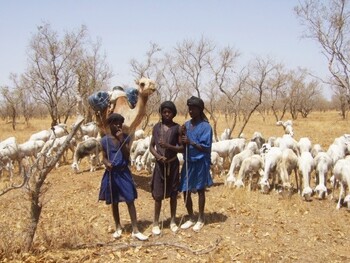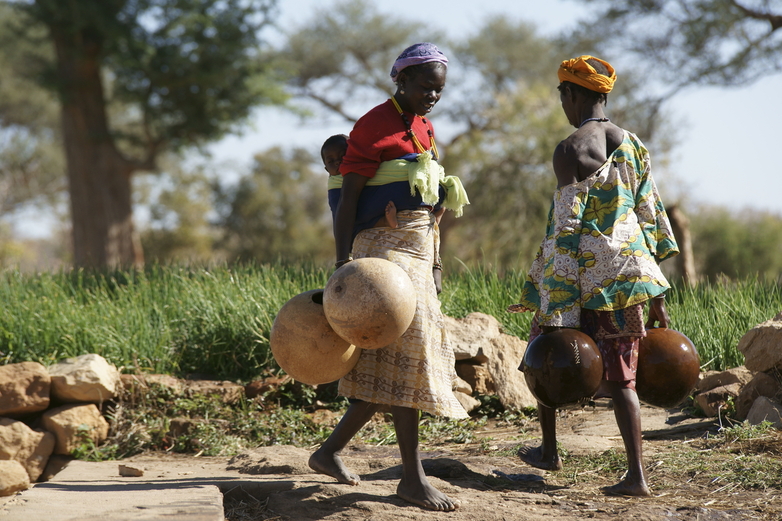Integrated management of border regions in Burkina Faso (EUTF, Federal Foreign Office)
Project description
Title: Integrated Management of Border Regions in Burkina Faso (ProGEF)
Commissioned by: German Federal Foreign Office
Co-financed by: European Union (EU), EU Emergency Trust Fund for Africa (EUTF)
Country: Burkina Faso
Lead executing agency: Ministère de l´Administration Territoriale, de la Décentralisation et de la Cohésion sociale (Ministry of Territorial Administration, Decentralisation and Social Cohesion, MATDC)
Overall term: 2016 to 2020

Context
Burkina Faso is located in the heart of West Africa, surrounded by six countries. The landlocked country's particular geographical location is conducive to cross-border trade and migration, both of which are major sources of income for Burkina Faso, one of the poorest countries in the world. At the same time, its location also poses a security risk. Some sections of the country’s long borders are neither marked nor sufficiently controlled and do not afford sufficient protection for the people.
The increasingly unstable conditions in the neighbouring countries of Mali and Niger are exacerbating the situation. The border regions in particular are a breeding ground for crime. Living conditions are often very poor. Due to the remote location, few public services are available, including basic public goods such as water and education. People often have to travel for hours to access medical care. Development opportunities are thus limited, forcing many people to move to urban areas or emigrate to neighbouring countries.
It is easy for violent groups, people traffickers and arms dealers to gain control over the border regions. They not only exploit the fact that the lack of structures erodes the people's trust in the state, but at the same time tempt people with sources of income that may be illegal but are often the only option for earning money. Security forces are not adequately trained or equipped to address this problem.
Objective
The Government of Burkina Faso improves the living conditions of the people in the border regions and promotes security and stability throughout the country.
Approach
Burkina Faso has responded to the challenges at its borders. With support from GIZ and as part of the African Union Border Programme, the Government has developed a national border management strategy and a programme to support integrated border management. The programme combines various approaches and stakeholders to promote social and economic development in border regions and to ensure better protection of the borders – and hence the people. Effective administration of border areas plays a key role in Africa, preventing conflicts, strengthening economic integration, creating better living conditions and promoting security and stability.
With funding by the European Union's Emergency Trust Fund for Africa (EUTF) and by the German Federal Foreign Office, GIZ is assisting Burkina Faso in implementing the border management strategy.
The programme cooperates closely with the Permanent Secretariat of the National Border Commission, which is responsible for implementing the border management programme. GIZ advises the staff on issues such as developing work plans, supports the creation of regional, cross-border coordination committees, and promotes exchange with the border commissions in Mali and Niger. This helps strengthen the institutional and legal framework for border management.
In order to protect borders and people more effectively, GIZ is training the police, gendarmerie and customs officers in carrying out border controls more efficiently while respecting human rights standards, preventing corruption and promoting communication and networking between the different forces. Even very basic equipment is often lacking at the border posts, such as electricity and telephone; this is being procured as part of the programme.
One of the key goals is to improve the living conditions of the populations in the areas bordering on Mali and Niger. This includes defining and marking borders where this has not yet been done adequately or at all. Infrastructure is being set up and developed to make clean drinking water, medical care, education and hygiene available. Workshops were initially held with local authorities and municipalities to identify needs, for example for wells, schools, health centres and latrines. The construction measures and repair work are being carried out in the project regions in Burkina Faso, but the social services are also designed to benefit the populations in Mali and Niger.
These measures not only improve basic services; they also help reinforce state presence in the remote regions and increase the people's trust in the government. By developing the infrastructure, the programme is not only providing short-term opportunities to generate income but is also promoting long-term employment in the regions.
